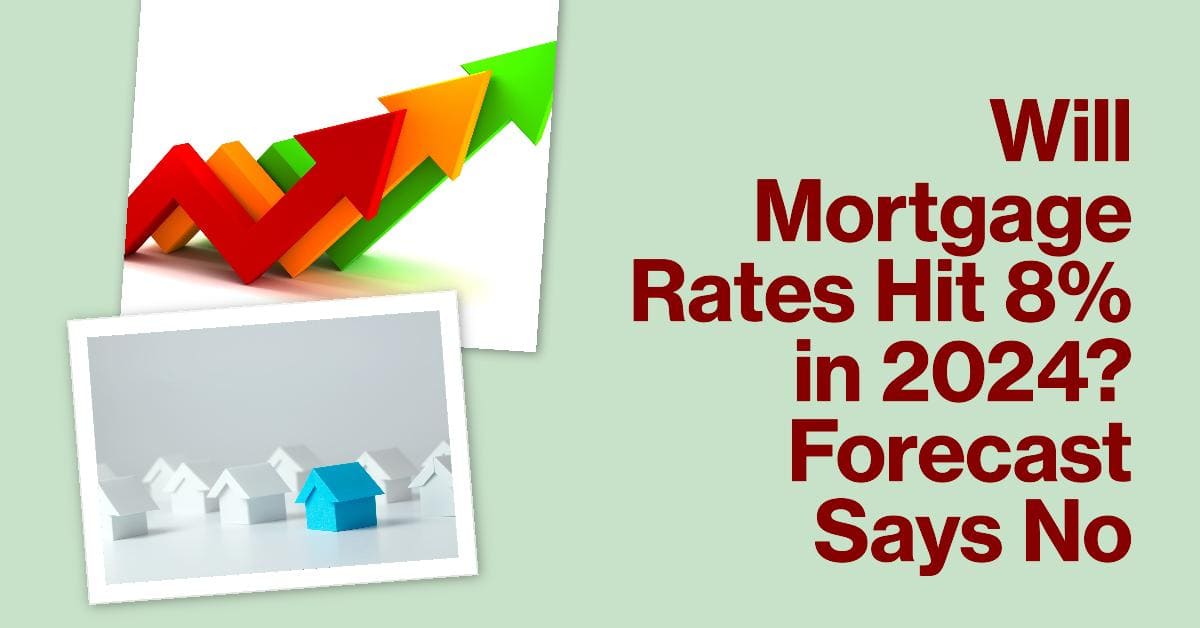As of April 18, 2024, mortgage rates have continued a recent upward trend, surpassing the 7% mark for the first time this year. This increase comes after a period of historically low rates in 2020 and 2021. Will mortgage rates hit 8% in 2024? Let's dive deeper into the current landscape, the reasons behind the rise, and what forecasts hold for the remainder of 2024.
Mortgage Rate Trends as of April 2024: Upward Shift
- 30-year fixed: According to Freddie Mac, the average 30-year fixed-rate mortgage reached 7.10% on April 18th, up from 6.88% the prior week. This marks a significant jump, especially for potential homebuyers who may have been house hunting earlier in the year with the expectation of rates staying below 7%.
- 15-year fixed: The 15-year fixed rate mirrored a similar rise, moving from 6.16% to 6.39%. While offering a lower interest rate than the 30-year fixed option, the 15-year loan also comes with a higher monthly payment, so this increase can affect affordability for borrowers who were counting on a specific budget range.
- Adjustable-rate mortgages (ARMs): Rates on ARMs also experienced fluctuations. While some rates remained steady, others, like the popular 5/1 ARM (fixed rate for the first 5 years, then adjusts annually), saw a noticeable jump to around 6.50%, according to Bankrate. This can be a concern for borrowers who are counting on the initial fixed-rate period to provide predictability in their monthly payments.
Reasons Behind the Increase
Several factors are influencing the rise in mortgage rates:
- Federal Reserve Policy: The Federal Reserve has been raising interest rates to combat inflation. This increase in the federal funds rate indirectly affects mortgage rates. As the Fed aims to slow down borrowing and spending to curb inflation, it makes borrowing more expensive overall, including home loans.
- Economic Data: Recent economic data, such as strong job reports, has bolstered the economy and fueled inflation concerns. A strong economy is positive news overall, but it can also lead to inflation if wage growth significantly outpaces productivity gains. This puts pressure on the Federal Reserve to raise interest rates to cool things down.
- Bond Market Yields: The yield on the 10-year Treasury note, which influences mortgage rates, has also been climbing. The Treasury note is essentially a loan you make to the U.S. government, and the yield is the interest rate you get in return. When Treasury yields rise, it can signal to investors that other interest rates, like mortgage rates, may also rise, which can cause mortgage lenders to adjust their rates accordingly.
Will Rates Hit 8% in 2024? Forecast Says No
While rates have risen, reaching 8% by the end of 2024 seems unlikely. Here's a breakdown of what experts predict:
- Gradual Increase: Most housing market forecasts anticipate a gradual rise in rates throughout 2024, with estimates ranging between 6% and 6.5% by year-end. This means that even though rates are higher than they were at the beginning of the year, they are unlikely to see a dramatic spike in the coming months.
- Potential for Relief Later in the Year: Some experts believe rates may even dip slightly later in the year if inflation shows signs of receding and the Federal Reserve adjusts its monetary policy. This is a hopeful outlook for potential homebuyers, but it's important to note that economic forecasts can change rapidly.
The Takeaway for Homebuyers
The current mortgage rate environment is less favorable than what homebuyers experienced in recent years. However, it's important to consider historical context. Rates are still below the historical average for 30-year fixed mortgages, which sits around 7.8%.
For potential homebuyers, this period underscores the importance of:
- Shopping Around for the Best Rates: Getting quotes from multiple lenders is crucial to ensure you're getting the most competitive rate possible. Even a small difference in interest rate can translate to significant savings over the life of the loan.
- Working with a Qualified Mortgage Professional: A mortgage professional can help you navigate the loan process, understand your eligibility for different loan programs, and guide you towards the best option for your financial situation.
- Considering Your Overall Financial Picture: While mortgage rates are an important factor, it's not the only one. Make sure you factor in your down payment, closing costs, and ongoing housing expenses to determine how much home you can comfortably afford.
By staying informed, being strategic, and working with qualified professionals, potential homebuyers can still navigate the current housing market and achieve their dream of homeownership. Here are some additional points to consider:
- Market Impact of Rising Rates: The rise in rates may cool off the housing market somewhat, particularly in areas that saw significant price increases during the era of historically low rates. This could potentially translate into more balanced market conditions with less competition for homes, which could benefit some buyers.
- Focus on Long-Term Affordability: While higher rates mean higher monthly payments, it's important to focus on long-term affordability. Locking into a fixed-rate mortgage provides stability and predictability in your housing costs over the life of the loan, which can be a positive factor for long-term budgeting.
The current rise in mortgage rates presents a new landscape for homebuyers. However, with careful planning, strategic decision-making, and the help of qualified professionals, navigating this environment and achieving homeownership remains a possibility. Staying informed about market trends, understanding your financial capabilities, and maintaining a long-term perspective are key factors in making informed decisions as you embark on your home buying journey.


